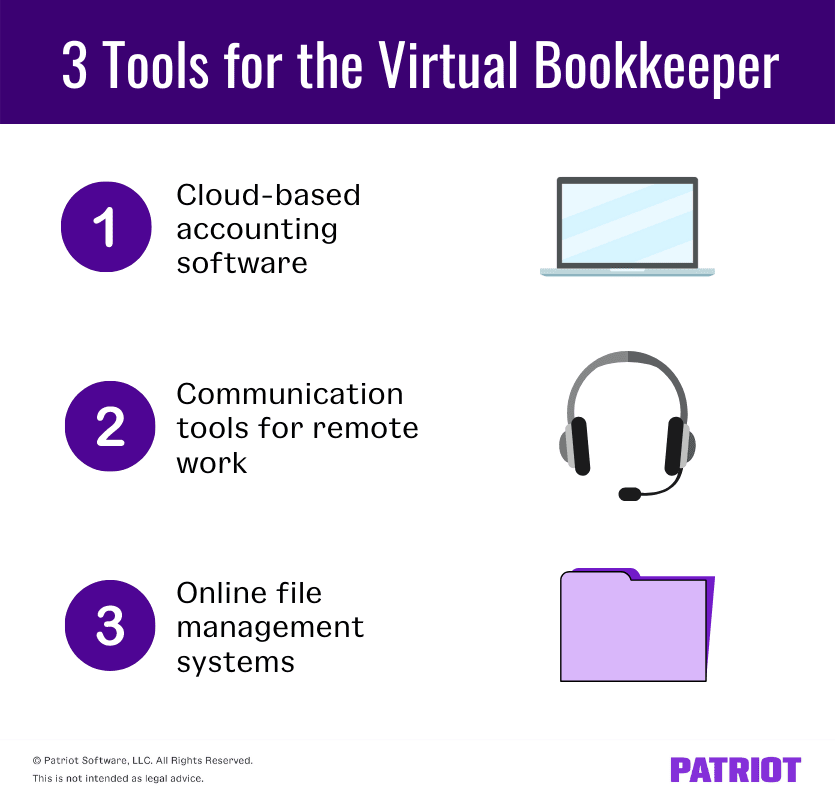Nowadays, everything seems to happen in the cloud and jobs everywhere are going remote. Well, go ahead and add virtual bookkeeping to that list. With virtual bookkeeping, accountants can work with clients remotely whether they’re in the same state or across the country. Interested in learning more about what it takes to become a virtual bookkeeper? Read on to get the scoop on the growing industry of virtual accounting services.
What is virtual bookkeeping?
Virtual bookkeeping allows bookkeepers and accountants to work wherever they’d like and virtually connect with clients all over the country. There are a few tools that bookkeepers need before getting started, such as:
- Cloud-based accounting software
- Communication tools to meet with clients remotely (e.g., video conferencing software)
- Online file management systems to share document
You have to do a bit of research to choose the right accounting software for your firm. When looking around for software, keep in mind:
- Costs and fees
- Level of customer service
- Security
- Learning curve
- Accessibility
If you’re thinking about starting virtual bookkeeping services, you also need to advertise online if you want to break into the market. Plus, you may want to consider creating a website for your virtual bookkeeping services to promote your offerings and give details.

Be virtual, with a capital “V”
Virtual accounting services don’t come out of thin air. You have to work hard to get your brand out there and attract new clients (or convince lifetime clients to make the shift to the cloud). To build your virtual bookkeeping services, advertise and cultivate a professional network online.
Social media platforms like LinkedIn and Facebook are great places to expose possible clients to your brand and the services you offer. When advertising online, don’t forget to mention some of the perks of hiring a virtual bookkeeper:
- Affordable and cost-effective
- Flexible
- Ability to scale as your client’s business grows
To attract clients, you may also want to highlight your certifications, education, and years of experience in your marketing efforts and on your website
How much should you charge for virtual bookkeeping services?
It can be difficult to know what to charge for your virtual bookkeeping services. There are several ways to tackle this issue. You could set a flat rate, charge by the hour, or use a sliding scale depending on the size of the client. When setting your prices, be sure to consider the:
- Frequency of service. Will you meet with clients only once, monthly, quarterly, or once a year?
- Number of services you offer. You could charge less if you only run payroll for a client. But if you add invoicing, account reconciliation, and taxes to your services, you can raise your price.
Costs of other virtual bookkeeping services. Remember that your competition is all over the country. Research the prices of your competitors and offer what you think is best. You want to stay competitive with pricing while still keeping the lights (and modem!) on, and make some money too.
Advertising online
You don’t have to be a social media guru to promote your virtual bookkeeping services online. To merchandise your brand online, remember to:
- Be kind in all of your interactions
- Clearly state the services you offer
- Connect with people whether or not they are leads
- Offer helpful advice and become a thought leader in your field
- Allow clients to review your business online
There are plenty of ways to connect with clients online, such as videos, blog posts, and social media posts. The biggest thing to remember is that you can’t afford to wait for clients to find you. You have to do the work to create interest in your services.
User-generated content (UGC) is a great way for your clients to spread the good news about your business on social media and other online platforms. Clients can share videos, images, reviews, or testimonials. UGC is a powerful tool—70% of consumers trust UGC more than professional ad copy. Here are four examples of UGC content and how to use them:
- Client testimonials. Your clients’ words go a long way. To harness the power of their voice, devote an entire page of your website to client testimonials. Make sure that it’s easy to find from your home page. To add a personal touch, ask clients if you can include their names. And if you find that you have testimonials that cover different aspects of your business, use them at different decision points of your website. You can also use client testimonials in other aspects of marketing, like in emails you send to potential clients.
- Five-star reviews. Think of five-star reviews as condensed client testimonials. You can place them around your web page, add them to your email campaigns, and promote them on social media. There’s a chance you’ll have some reviews that aren’t that great. Just because you have three- or four-star reviews (or even one-star!) doesn’t mean that you should hide them. Less-than-perfect reviews can help create authenticity around your business.
- Hashtag campaigns. Hashtag campaigns can help boost interaction with your brand online. Hashtags are a simple way to show off other UGC, such as client testimonials. Once the client makes their testimonial, they can add your specific hashtag (e.g., #virtualbookeepingrocks) and all the posts are searchable together. One of the best things about hashtag campaigns is that they can work with any type of media across multiple platforms.
- Surveys. Surveys are a great way to touch base with your clients and determine how you’re doing. They can also help you improve your business. Listen to what your clients are saying. Their complaints may be the perfect thing to focus on to enhance your business.
If you’re interested in opening a virtual bookkeeping business, Patriot’s accounting software may be just what you need to get started. Our accounting software is top-rated for price and ease of use. Try us today, and tomorrow we’ll help your business thrive.
This is not intended as legal advice; for more information, please click here.



